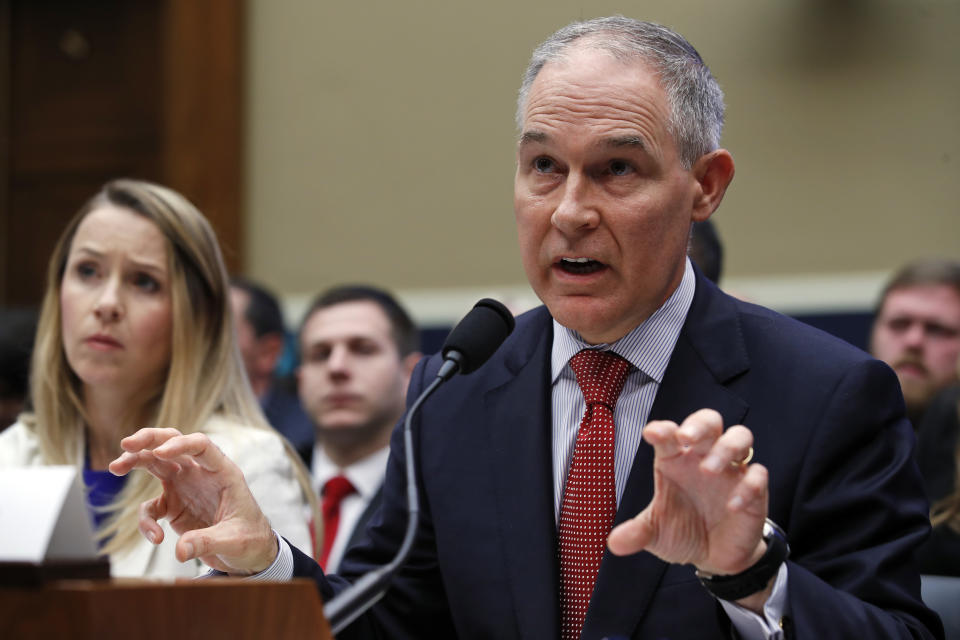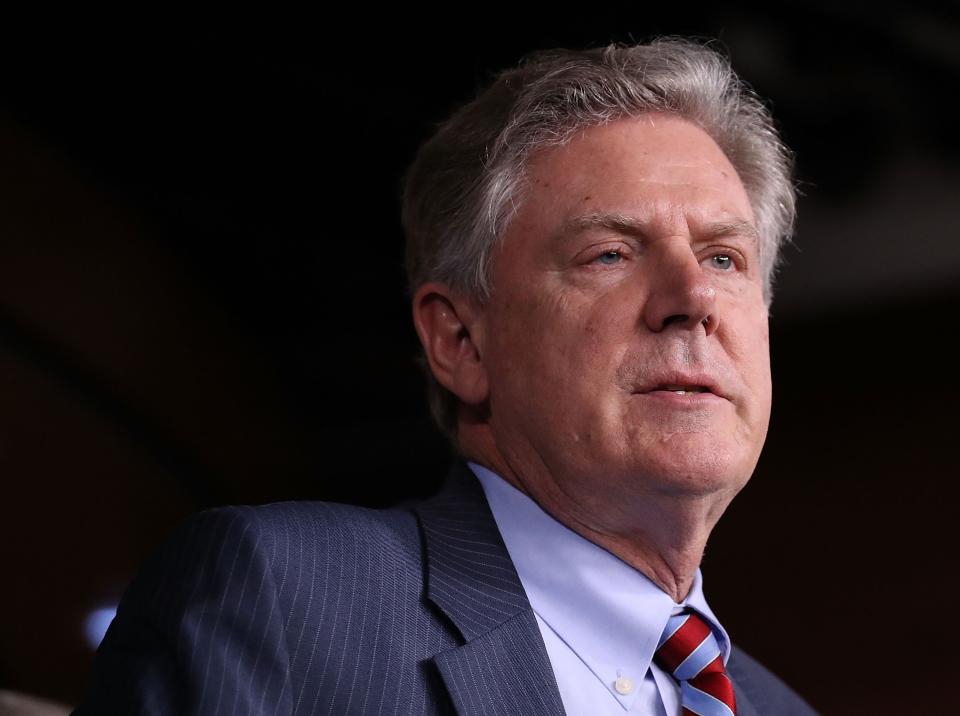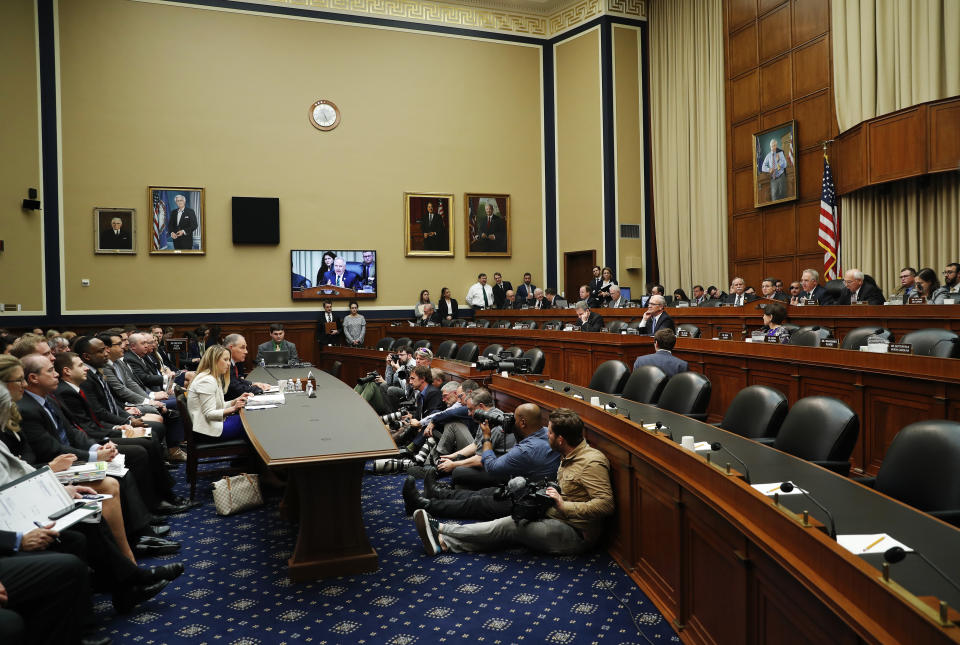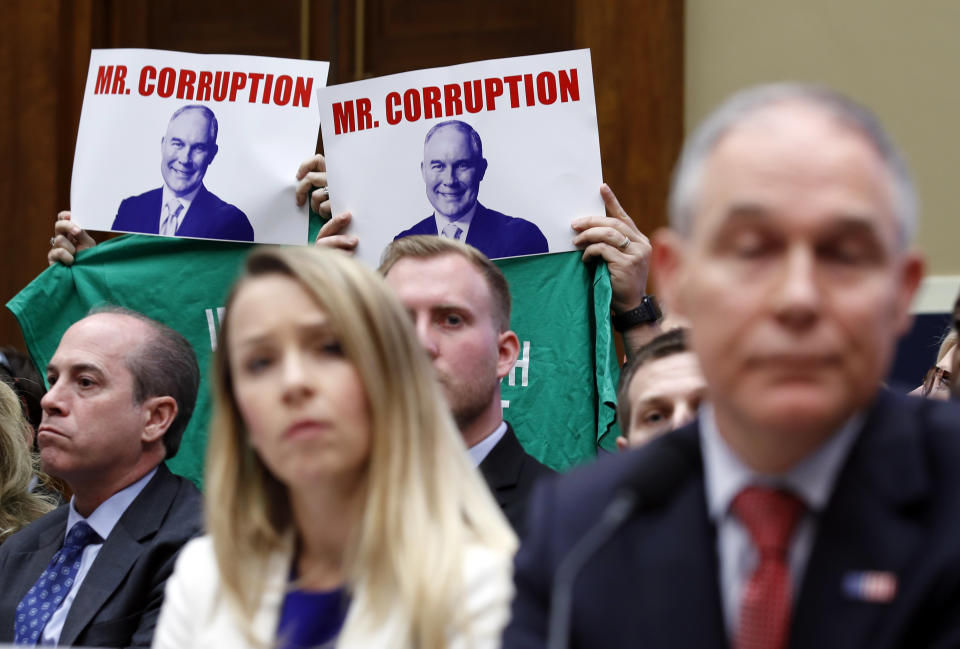EPA chief Pruitt faces questions in Congress over deregulation: 'Your agenda costs lives'
Tempers flared as Scott Pruitt, the embattled administrator of the Environmental Protection Agency (EPA), sat down Thursday before two congressional panels for a long day of questioning about his policies and the way he runs his agency.
Pruitt’s close ties to the fossil fuel industry, efforts to roll back environmental regulations and readiness to deny climate change have made him a longtime target of Democrats and environmentalists. Though he is praised by conservatives for those same reasons, Pruitt’s support among Republicans has recently dropped amid allegations of extravagant spending and other ethics violations.
Pruitt was already on the defensive as he settled into his chair to testify before the House Energy and Commerce subcommittee at 10 a.m. He will also appear before a House Appropriations Committee panel around 2 p.m. But the person he needs to impress — the person who can decide Pruitt’s fate — will be watching from the White House.
Rep. Frank Pallone, D-N.J., a ranking member of the Energy and Commerce subcommittee, was among Pruitt’s fiercest critics.
“I’m confident that these investigations will affirm what I have come to believe is true: that you’re unfit to hold public office and undeserving of the public trust,” Pallone said. “And I don’t say those words because I particularly dislike you or hold you in ill repute. I just think that every indication we have is you really should resign and you are undeserving of the public trust.”
He called Pruitt out for allegedly creating an environment of fear of reprisal at the agency, which has caused public servants to flee and important initiatives to stall — most notably a proposed ban on a deadly chemical in common paint removers that’s still claiming lives.
He harshly criticized Pruitt’s opening statement in which he rationalized not resigning by saying he’s the only person who can carry out President Trump’s agenda of deregulation.
“I actually disagree with that. I think your actions are an embarrassment to President Trump and distract from the EPA’s ability to effectively carry out the president’s mission,” Pallone said. “And if I were the president, I wouldn’t want your help. I’d just get rid of you.”

Pallone referred to reports that Pruitt even retaliated against EPA employees for questioning his spending patterns or management style, and sidelined staffers who tried to advance important measures to safeguard the public health. When asked whether these reports were true or false, Pruitt responded, “I don’t ever recall a conversation to that end.”
Pallone also asked Pruitt about reports that he removed an official who disputed Pruitt’s assertion that he needed a larger security detail because he faced death threats. When asked whether it was his policy to fire people who disagree with him, Pruitt said, “Congressman, the inspector general himself has noted that the threats against me are unprecedented, with respect to the quantity and type of threats.”
“Well, you’re not answering yes or no,” Pallone said. “Six staffers is a pattern. I think you need to start taking responsibility. You say you’re going to take responsibility, but you don’t.”
The New Jersey lawmaker expressed concern that Pruitt had created a fear-of-retaliation environment at the EPA, which has caused career officials to leave — only to be replaced by industry lobbyists.
To illustrate his point, Pallone referenced the case of Wendy Cleland Hamnett, the former top official of the EPA’s chemicals and pesticides office. Her resignation on Aug. 24, 2017, after 38 years with the agency created a leadership vacuum.
Hamnett, an expert on toxic substances, had been fighting to finalize a ban on methylene chloride — also known as dichloromethane — a dangerous chemical found in common paint strippers that has been linked to fatal poisonings. The New York Times and other outlets have reported that her efforts were hindered by the chemistry industry lobbyist whom Pruitt tasked with regulating chemicals: Nancy B. Beck. Under Pruitt’s administration, the EPA has abandoned its proposal to ban methylene chloride.

Pallone said that manufacturers of methylene chloride paint stripper have been aware of deaths linked to its use for more than 28 years but continued to produce it. He criticized Pruitt for not implementing the proposed ban.
Pallone shared several stories about young men who died after using methylene chloride. A small-business owner, Drew Wynne, 31, died in October 2017 after using a common paint stripper. Then in February 2018, another young man, Joshua Atkins, 31, died after using a common paint stripper on his bike. Pallone said Atkins’s mother sent him a deeply touching letter, in which she expressed the hope that her son would be the last person to die from using this chemical. Pallone added that letter to the record.
“Mr. Pruitt, your deregulatory agenda costs lives. Real people — with names, with mothers, with brothers,” said Pallone. ”You have the power to finalize the ban on methylene chloride now and prevent more deaths, but you haven’t done it. Do you have anything to say to these families?”
“Congressman, as I was trying to indicate earlier, there is a proposed ban in place that we took comment on that we’re reviewing presently. There has been no decision at this time,” Pruitt said.
“Obviously, you have nothing to say to these families,” Pallone shot back. “Look, you say you’re going to do something but these chemicals are still on the shelves, and they make a mockery of Lautenberg’s TSCA reform legislation that this committee worked so hard on. … It makes a mockery of the EPA.”
The Frank R. Lautenberg Chemical Safety for the 21st Century Act, which passed Congress in 2016, amends the Toxic Substances Control Act (TSCA) from 1976. It requires the EPA to assess existing and new chemicals for risks with “clear and enforceable deadlines” and provide transparent chemical information to the American public.

According to the EPA fact sheet on methylene chloride, the compound poses “unreasonable risks” to the health of consumers, workers and bystanders in homes or workplaces where it’s been used. Short-term exposure can result in damage to the central nervous system. Long-term exposure can cause lung cancer, liver toxicity and liver cancer.
The congressional hearing was nominally about the EPA’s budget. However, the cloud hanging over each exchange was the allegedly profligate manner with which Pruitt spent taxpayer dollars — particularly on himself.
Ana Unruh-Cohen, the director of government affairs for the Natural Resources Defense Council, said this is a critical, make-or-break hearing for Pruitt.
“We’ve had months of both members of the House and Senate looking at what’s happening over at EPA on the spending front as well as numerous media investigations,” she said. “In any other administration — given the ethical questions around his actions — I think it’s pretty likely he’d already be gone. But since it appears the president is satisfied with what he’s doing on the policy side of things, he’s still around.”
Unruh-Cohen said it’s hard for Republicans to take the constant headlines about Pruitt spending taxpayer dollars on lavish, unnecessary things. Trump ran, in part, against Washington, D.C., and “the swamp.”

Now Republicans are in a position where they’re forced to ask tough questions of Pruitt because the constant headlines make it seem as if he’s not a trustworthy steward of taxpayer dollars — even if they like his policies.
“There’s a long history of voters getting fed up with things that seem like lavish government spending on their dime,” Unruh-Cohen said. “They’re the ones paying taxes. Democrats clearly don’t like his policies. This just adds his wasteful — in some places, allegedly illegal — use of funds, which underscores their concern for him.”
Read more from Yahoo News:



